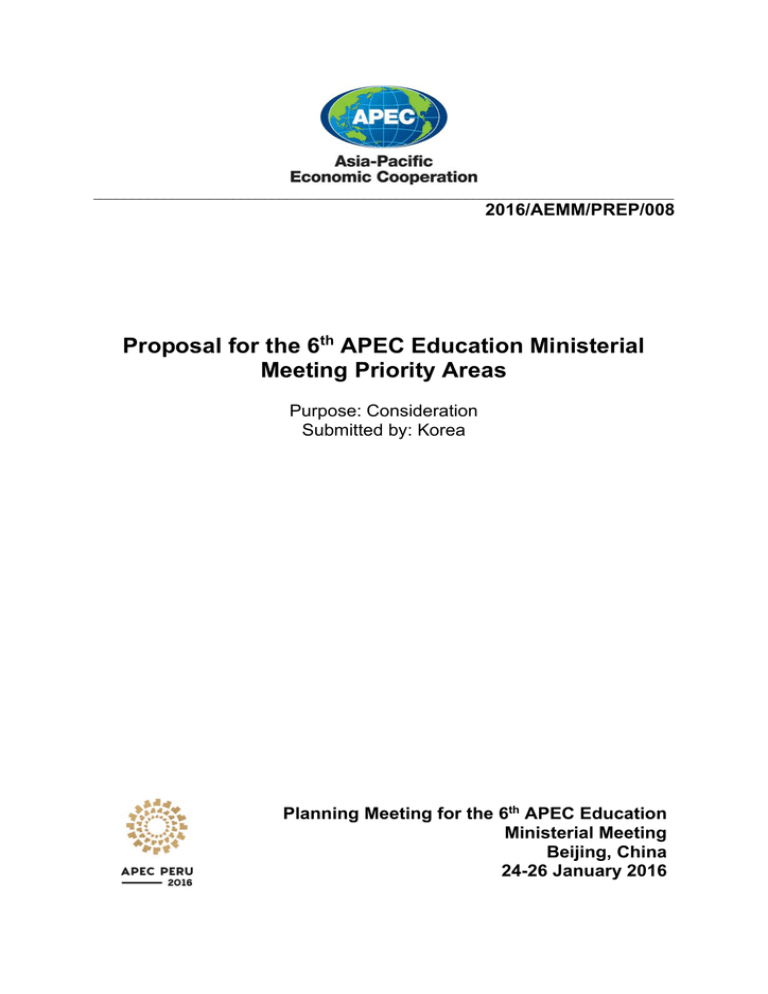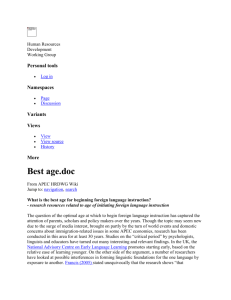Proposal for the 6th APEC Education Ministerial Meeting Priority Areas
advertisement

___________________________________________________________________________ 2016/AEMM/PREP/008 Proposal for the 6th APEC Education Ministerial Meeting Priority Areas Purpose: Consideration Submitted by: Korea Planning Meeting for the 6th APEC Education Ministerial Meeting Beijing, China 24-26 January 2016 12/2/2016 Proposal for The 6th AEMM Priority Areas A. Education Cooperation(to be presented seperately at the Progress Report for the ECP) B. Education Innovation by ICT for linking innovation and creativity with human resources How tech can help? Sam Saba (President, Ericsson)’s posting at the World Economic Forum Blog ICTs help to boost South-East Asian economies: • a 10% increase in mobile penetration ave. 1% sustainable GDP • Doubling broadband speeds adding 0.3% to GDP growth. But, ensuring “Connectivity” available and accessible for all overcoming barriers: infrastructure, affordability and usage Source: World Economic Forum – Global Forum (Apr. 21, 2015) http://www.weforum.org/agenda/2015/04/how-tech-can-help-end-poverty-in-asia/ 1 12/2/2016 How tech can help? Source: The Mobile Economy 2015 (GSM Association, 2015) How education can help? Ban, Ki-moon (Secretary General, UN) …On this Day, I call for investing politically and financially in developing the skills of young people so that they can help build a more just and sustainable future for all… …With the right skills, these young people are exactly the force we need to drive progress across the global agenda and build more inclusive and vibrant societies… At the First UN World Youth Skills Day Julia Gillard (Chair of the Board of Directors, Global Partnership for Education) …education community has really come together and it’s really clear what we are all pushing for now. It’s great to see that increasing alignment…. One of things I’m powerfully struck by is how clear the recognition is to achieve any and all of the sustainable development goals requiring education as an enabler. At the Third International Conference on Financing for Development 2 12/2/2016 How education and tech can help? OECD Digital Economy Outlook 2015 (OECD, 2015) • Promoting ICT adoption in education ranks high among national digital strategies with one frequently stated aim being to capitalize on the digital revolution to improve the effectiveness of the education system and ensure the development of basic and advanced ICT skills. • Education is also critical to the economy: inclusiveness and innovations in education are strongly interrelated, since inequality has a negative impact on innovation-based growth. • Strategic areas include the role of ICT in societal development with a focus on ICT for global development, and related issues such as research and innovation, ICT for the environment, gender equality, freedom on the net and copyright. Consideration Recent Policies Only Technologies Traditional Policies Covering horizontal issues covering from business creation and productivity growth to public administration, employment and education, health and aging, environment and development Source: OECD Digital Economy Outlook 2015 (OECD, 2015) 3 12/2/2016 Recent Development in the APEC Key Issues APEC Priorities Bogor Goals 2020 Inclusive GrowthNEW! APEC Connectivity Blueprint 2015-2025 • Physical Connectivity (Infrastructure Investment by PPP and Internet Access) • Institutional Connectivity (Customs and Supply Chain) • People-to-People Connectivity (Business Travel Card and Scholarship Initiative) Source: APEC Official Website (http://www.apec.org/About-Us/About-APEC/Fact-Sheets/Connectivity.aspx) Recent Development in the APEC Key Issues APEC Philippines 2015 Building inclusive economies, building a better world • • • • Investing in Human Capital Development; Fostering Small and Medium Enterprises’ (SMEs) Participation in Regional Global Markets; Building Sustainable and Resilient Communities; and Enhancing the Regional Economic Integration Agenda. Source: APEC Philippines 2015 (http://apec2015.ph/) 4 12/2/2016 Recent Development in the APEC Key Issues APEC Peru 2016 Quality Growth and Human Development • • • • Priority 1: Advancing Regional Economic Integration and Quality Growth Priority 2: Enhancing the Regional Food Market Priority 3: Towards the Modernization of MSMEs in the Asia-Pacific Priority 4: Developing Human Capital Source: APEC 2016 ISOM APEC Education Innovation by ICT proposed by Korea 5 12/2/2016 APEC Education Innovation by ICT proposed by Korea APEC Education Innovation by ICT proposed by Korea 6 12/2/2016 APEC Education Innovation by ICT proposed by Korea APEC Education Innovation by ICT proposed by Korea Training & Sharing APEC e-Learning Training Program Direction & Contents Human Network APEC Learning Community (ALCom) e-Education (AELM, 1999) APEC Cyber Education Cooperation Consortium APEC Future Education (AFEC) Future Education (AEMM, 2004) Sustainable Impact Gyeongju Initiative Education Cooperation Project (ECP) Gyeongju Initiative (AEMM, 2012) APEC Future Education Consortium 7 12/2/2016 5th AEMM – Innovative Education ICT in Education Current Status in Korea 8 12/2/2016 Current Status in Korea • Online Life-Long Education Information System (by OER, K-MOOC) • ICT policy for Convergence Industry (VR training system) • Customized Program for Career Development (Free Semester) • Fair opportunity in Education by ICT (Smart Device based Video Conference Mentoring for students in rural areas) Dream[꿈, Kkum] and Talent[끼, Kki] for Human Capital Development Current Status in Korea Education Innovation by ICT to flourish creativity of young generation by using advanced ICT solutions to pursue openness between science, technology and liberal arts, education with active communication and cooperative activities 9 12/2/2016 Thank you 10


